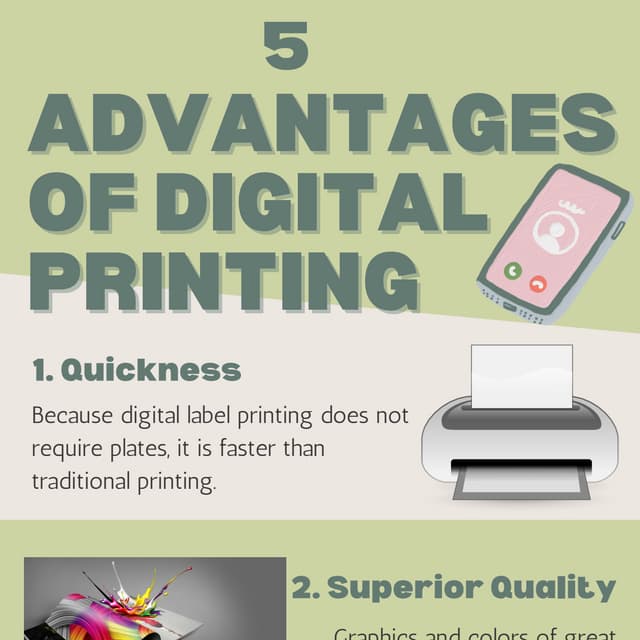4 Easy Facts About Digital Printing Explained
4 Easy Facts About Digital Printing Explained
Blog Article
Digital Printing Fundamentals Explained
Table of ContentsLittle Known Questions About Digital Printing.The 7-Second Trick For Digital PrintingThe 7-Second Trick For Digital PrintingSome Of Digital PrintingThe Digital Printing IdeasNot known Details About Digital Printing
Variable data printing, such as direct mail with customized codes and addresses, is preferably matched for electronic printing. Digital quick printing only requires 4 steps of style, review, printing and binding to get every little thing done. Digital quick printing has an exceptional benefit: print on need.According to PMMI, digital printing allows brand names and manufacturers to respond rapidly to customer needs while improving the supply chain, reducing warehousing cost and waste, and taking pleasure in faster time to market. That all sounds excellent, however exactly how does this technology do all that? The major differentiator of these innovations is that there are no set-up costs and no plates with electronic printing.
Digital Printing Things To Know Before You Buy
According to Wikipedia, the best distinction in between digital printing and traditional methods such as lithography, flexography, gravure, or letterpress - Digital Printing is that there is no demand to replace printing plates in electronic printing, whereas in these analog printing techniques home plates are repeatedly changed. This results in quicker turn-around time and decreases expense when making use of digital printing.
Digital printing is highly versatile, so it's very easy to make modifications to the bundle layout quickly. It all goes back to the plates.
More stock can indicate even more waste in the future. With standard printing approaches, short-run printing is just not possible. Because a fantastic style can make or damage your item, electronic printing regularly produces high-grade, clear and colorful graphics each time. Digital printing on flexible pouches adds the brilliant, lively, and accurate graphics that virtually bid customers to get to out and touch them.
Digital printing is the process of printing digital-based photos straight onto a selection of media substratums. There is no requirement for a printing plate, unlike with offset printing. Digital data such as PDFs or desktop publishing documents can be sent out directly to the digital printing press to publish on paper, photo paper, canvas, textile, synthetics, cardstock and various other substratums.
Digital Printing - Truths
According to PMMI, electronic printing enables brands and suppliers to respond swiftly to client needs while improving the supply chain, reducing warehousing expense and waste, and taking pleasure in faster time to market. That all sounds wonderful, yet just how does this innovation do all that? The major differentiator of these modern technologies is that there are no set up fees Your Domain Name and no plates with digital printing.
According to Wikipedia, the greatest difference in between digital printing and standard techniques such as lithography, flexography, gravure, or letterpress is that there is no need to change printing plates in electronic printing, whereas in these analog printing methods the plates are repeatedly replaced. This leads to quicker turn-around time and decreases expense when utilizing electronic printing.

Digital Printing - The Facts
With traditional printing methods, short-run printing is simply not feasible. Since a great layout can make or damage your product, digital printing continually develops premium, clear and vivid graphics each time.

According to PMMI, electronic printing enables brands and suppliers to react swiftly to customer needs while boosting the supply chain, lowering warehousing expense and waste, and taking pleasure in faster time to market. That all sounds terrific, but just how does this technology do all that? The significant differentiator of these modern technologies is that there are no set-up charges and no plates with digital printing.
The Main Principles Of Digital Printing
According to Wikipedia, the biggest distinction between digital printing and traditional methods such as lithography, flexography, gravure, or letterpress is that there is no requirement to change printing plates in digital printing, whereas in these analog printing techniques the plates are repeatedly changed. This causes quicker turn-around time and lowers cost when utilizing electronic printing.
Quick production indicates obtaining your item to market much faster. It also redirected here implies it's easier and faster to make changes later on, when you change a recipe, add a SKU, or create seasonal packaging. Digital printing is highly versatile, you could try these out so it's simple to make modifications to the package layout rapidly. It all goes back to the plates.

Get This Report on Digital Printing
Digital printing is the procedure of printing digital-based images directly onto a range of media substratums. There is no requirement for a printing plate, unlike with offset printing. Digital data such as PDFs or desktop publishing documents can be sent directly to the electronic printing press to publish on paper, picture paper, canvas, material, synthetics, cardstock and other substratums.
Report this page